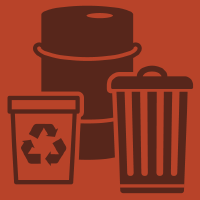Topic Editors

Converting and Recycling of Waste Materials
Topic Information
Dear Colleagues,
This Topic brings together multidisciplinary research focused on transforming agricultural residues, biomass, and agro-industrial byproducts with value-added, carbon-based products. Innovations in thermal, biological, and chemical conversion technologies offer promising solutions to reduce waste, enhance soil health, generate renewable energy, and create sustainable chemicals, supporting circular bioeconomies and climate-smart practices.
We invite contributions that explore the development, optimization, and application of technologies such as biochar production, anaerobic digestion, pyrolysis, composting, and fermentation, particularly those that generate environmental, economic, and social co-benefits in the context of sustainable agriculture, food security, and resource recovery. These technologies have the potential to improve plant health, reduce disease pressures, support equitable food systems, and enhance STEM education through real-world applications and community engagement. We especially welcome interdisciplinary work that connects technical innovation with inclusive pedagogical strategies and equity-centered practices, fostering collaboration among researchers, educators, and practitioners across engineering, agricultural sciences, environmental sciences, and social sciences.
By bridging technical innovation with inclusive practices, this Topic seeks to advance knowledge and real-world impact in waste valorization, agroecology, and sustainability education.
Dr. Simeng Li
Dr. Tolulope A. Agunbiade
Topic Editors
Keywords
- waste valorization
- biochar
- biogas
- agro-industrial byproducts
- sustainable agriculture
- soil amendments
- circular bioeconomy
- STEM education
- food security
Participating Journals
| Journal Name | Impact Factor | CiteScore | Launched Year | First Decision (median) | APC | |
|---|---|---|---|---|---|---|

C
|
2.9 | 3.4 | 2015 | 24.3 Days | CHF 1600 | Submit |

Polymers
|
4.9 | 9.7 | 2009 | 14 Days | CHF 2700 | Submit |

Recycling
|
4.6 | 8.9 | 2016 | 20.9 Days | CHF 1800 | Submit |

Sustainability
|
3.3 | 7.7 | 2009 | 19.3 Days | CHF 2400 | Submit |

Waste
|
- | - | 2023 | 30.5 Days | CHF 1000 | Submit |

Preprints.org is a multidisciplinary platform offering a preprint service designed to facilitate the early sharing of your research. It supports and empowers your research journey from the very beginning.
MDPI Topics is collaborating with Preprints.org and has established a direct connection between MDPI journals and the platform. Authors are encouraged to take advantage of this opportunity by posting their preprints at Preprints.org prior to publication:
- Share your research immediately: disseminate your ideas prior to publication and establish priority for your work.
- Safeguard your intellectual contribution: Protect your ideas with a time-stamped preprint that serves as proof of your research timeline.
- Boost visibility and impact: Increase the reach and influence of your research by making it accessible to a global audience.
- Gain early feedback: Receive valuable input and insights from peers before submitting to a journal.
- Ensure broad indexing: Web of Science (Preprint Citation Index), Google Scholar, Crossref, SHARE, PrePubMed, Scilit and Europe PMC.


